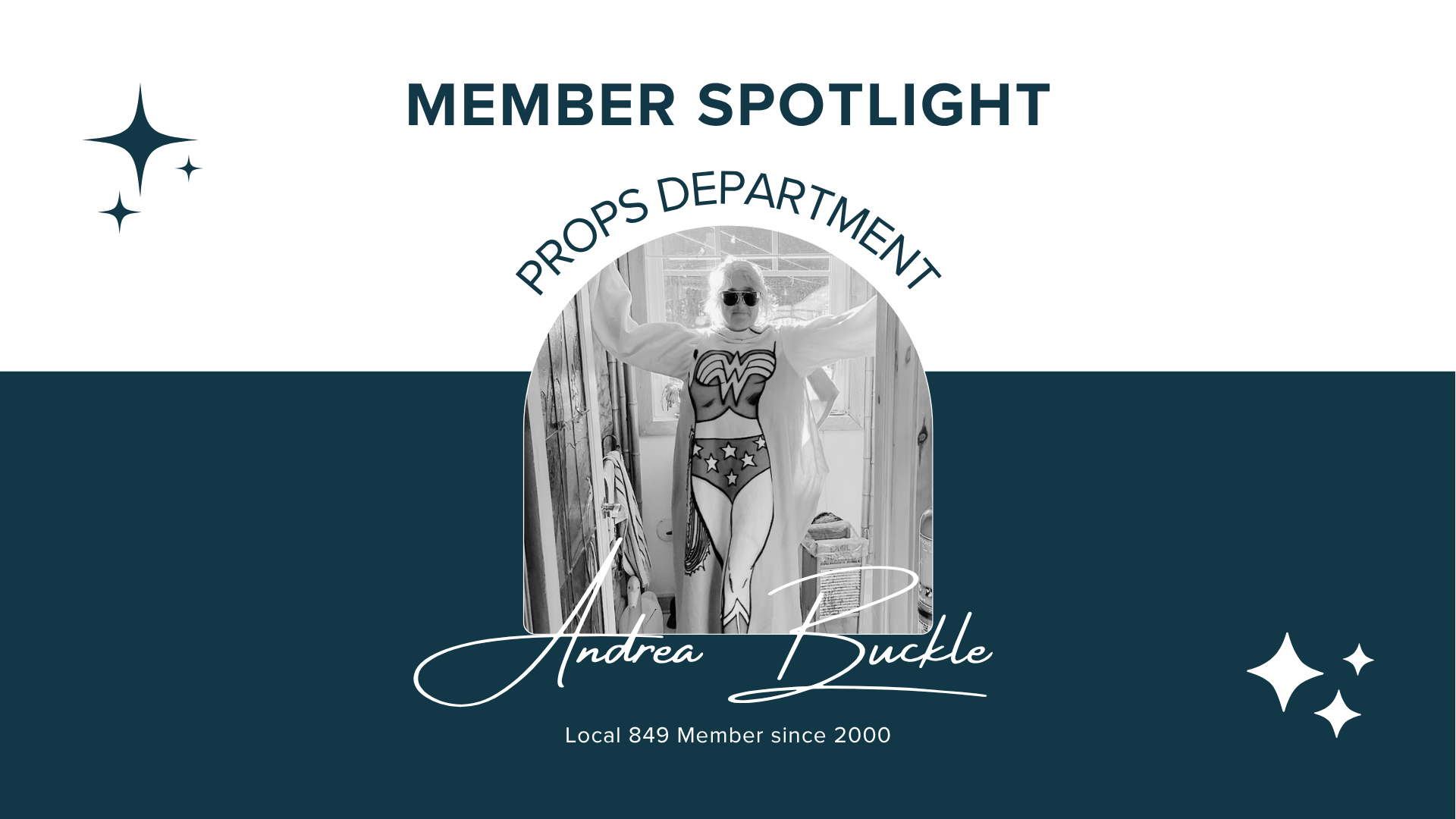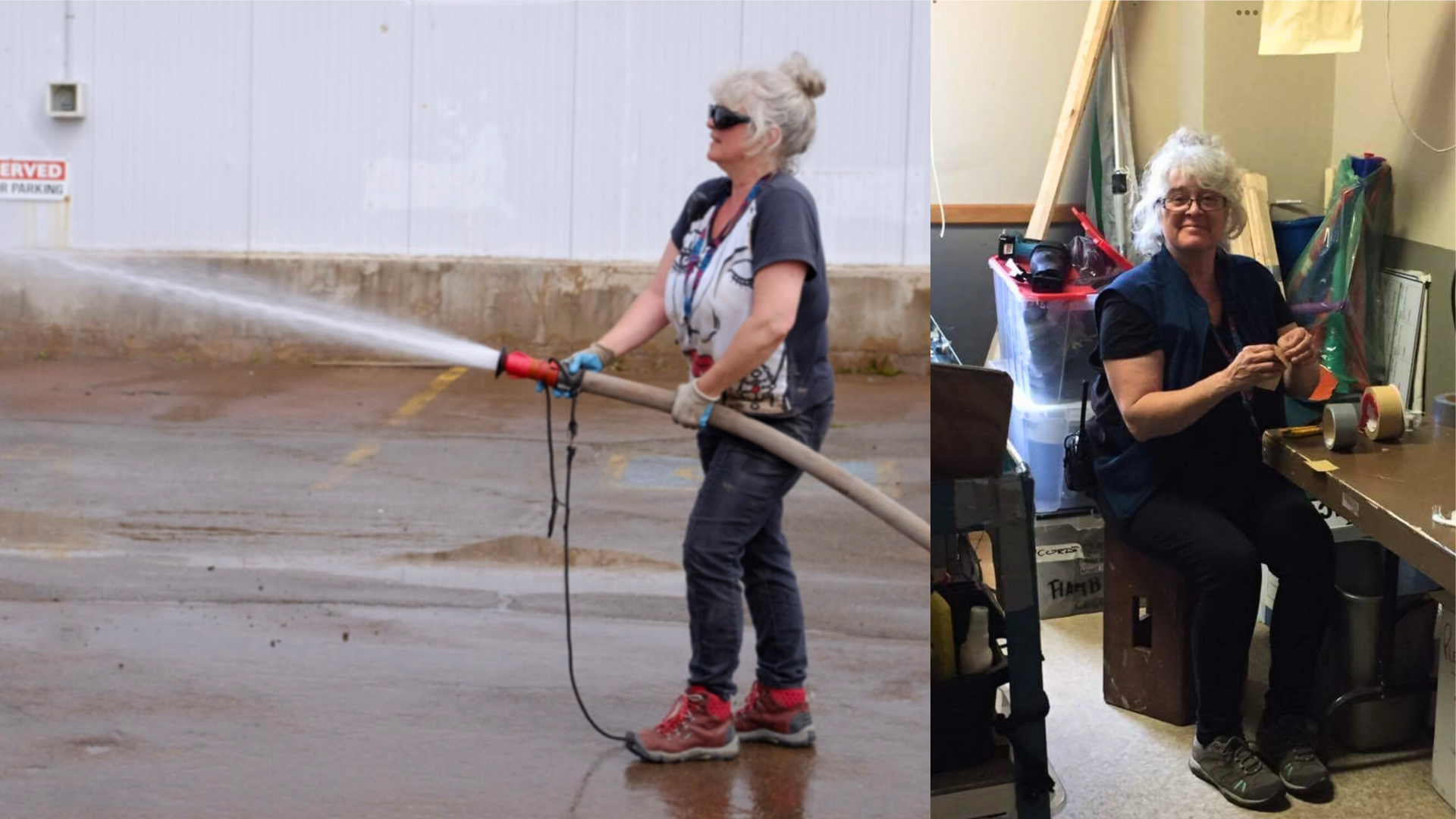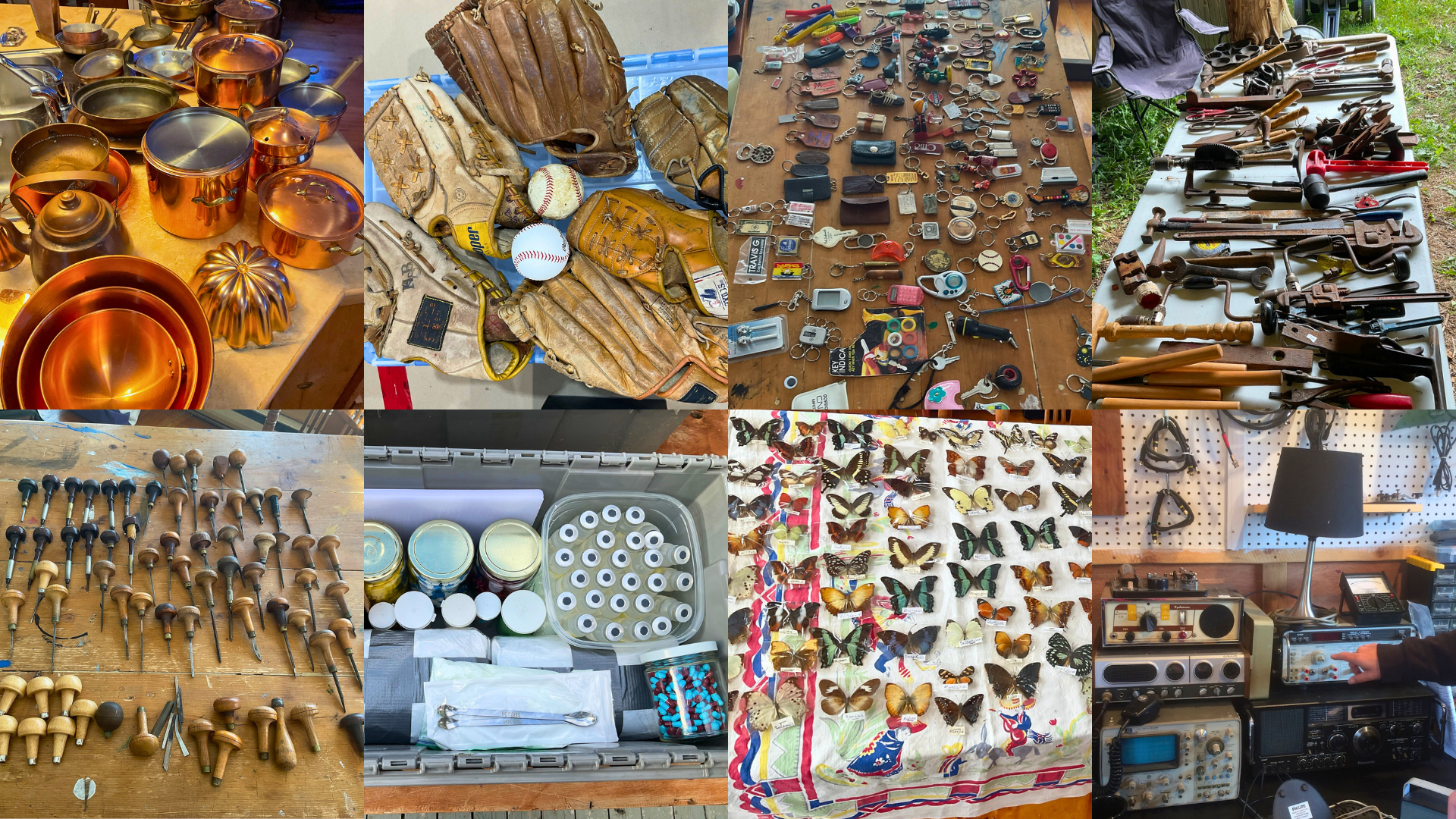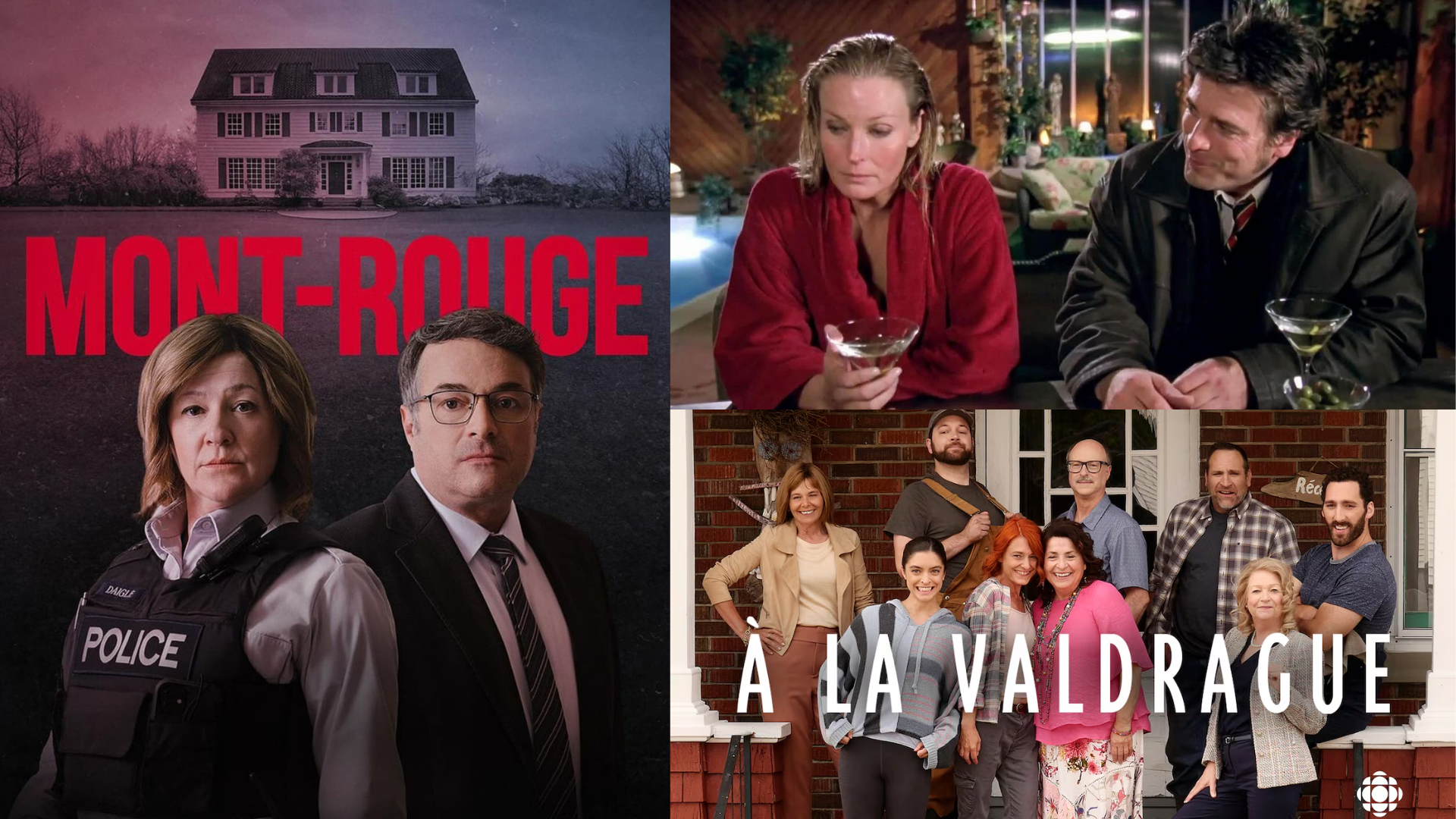
Andrea Buckle shares what's in her prop collection (meteorite anyone?), working in New Brunswick, and why she loves being a technician of imagination.
What is the role of the Props Department on a production:
Props are the heart of the film as far as I'm concerned. That's where my heart is. Props work closely with the director. I call myself a technician of imagination, and I think that’s what Props is. You have to be able to go inside the mind of the director or the art director and try to make what they envision in their head come to life.
What does a day in Props look like:
Whether you're in prep or not, you will look at your script to see what's involved for the day. You have to know when [a prop] will be needed and be able to provide it for that time, researching, buying, building. Props can include the vehicles, the animals, the special effects, and food. Also, I've done a lot of special effects over the years, everything from blowing out insulation as ash like a volcanic eruption to dealing with tarantulas. We did a show a couple years ago where we had to create a way to burn underneath a guy's hand without seeing anything. I’ve done a few drownings. It's over the top all the time. And the weirder it is, the better it is. It's never boring.
 Andrea Buckle on set
Andrea Buckle on set
How did you get started in film:
I met Property Master Bernice Butler. She was starting prep on a feature, in Fredericton, and needed an assistant as no technicians were available. I quit my full-time office job for a six-week contract as a prop assistant. We were taking care of tarantulas, rats, fake scissors, food, a sauna, martinis … the list goes on and on … and on. Halfway through filming, due to a family emergency, I became property master. I found myself on set, serving a candlelight dinner, in front of a fireplace, with Bo Derek and Wayne Rogers. I loved it. There was no turning back.
Since my first production in 1999, I’ve been a props assistant, a property master, a props builder, and props buyer. I’ve also been the decorator, assistant decorator, and art director on feature films, TV series, commercials, etc. I’m predominantly a props buyer now. I’ve been in this industry for over 25 years. If I had known it existed earlier, I would’ve been there.
What advice would you give to someone interested in working in this industry:
There's always going to be office jobs or other jobs. Never settle for a job; look for a passion. If you don’t know what you want to do, go on the road that entices you the most. Eventually, the opportunity will present itself. Make sure you keep your eyes open so you can recognize it.
What skills do you need to work in the Props Department:
- Know your script. No matter what the job is I know my script. I've read it at least three times before I even begin, whether it's as a buyer, an assistant or a property master. You also need to be able to identify the things you know will cause trouble or the things that will be hard to find before you can continue.
- Be organized. You need to know where your stuff is, where the props are in the truck, where your paperwork is, where you are, and where you're going. You need to know your continuity.
- Learn to be adaptable. You have to be able to change direction on a dime if something happens. We don't have this? OK, there are two other ways that you can do that. Or maybe we can use something else or do something else. You have to be able to think in ABCD options, kind of thing.
- Do your research. Research is everything because you want [the props] to be as authentic as possible, even if it's the present day. You have to take the time to do the research to see if it will be plausible because if you don't believe it, nobody will. And the first thing you gotta do is sell it to the director.
- Perspective. In props, no matter how much you know, you know very little. On every show, you have to create something/learn something new.
- Try anything. If you get the chance to build, if you get the chance to buy, if you get the chance to hold the door for the guy who's doing it; whatever it is, get your foot in there. Don't say you know how to do it; say "I don't know, but I'm willing to try it." That will get you anywhere because your attitude is huge.
Never settle for a job; look for a passion. If you don’t know what you want to do, go on the road that entices you the most. Eventually, the opportunity will present itself. Make sure you keep your eyes open so you can recognize it.
What is one of your fondest memories of working in the Props Department:
One of the most interesting was a docu-fiction. We had to make all the accessories for the period 1604. I loved it. We made birch bark buckets to get the water. We made the spears so that they could catch the fish, snowshoes out of trees, and a pot to cook soup out of a cow's stomach. The neighbours look at me weirdly sometimes cause it all comes home first. Everything had to be authentic.
Tell me about your props collection:
Most of the props I have—what I call treasures—are from the 20s to the 80s. We used to do a lot of period films here. I have a prop house and it has probably 500 boxes of stuff. It's a dangerous thing to do because you’ll never have everything you want. Once you start, you can’t stop. You may never use an item for your entire life, but that's the problem. Because you don't know. I have had to have a wasp nest, a meteorite, and sea shells out of season. If they need a grenade, I've got one. If they need a police belt, I've got one. If they need some hats, I've got one. There is no end to what you need. It gives me a sense of security to have some basics.
 A selection of photos showcasing Andrea's extensive props collection
A selection of photos showcasing Andrea's extensive props collection
What is the industry like in New Brunswick:
I work in French most of the time. When I started there was an English and a French crew. After the tax cut, I have worked mainly on French productions. I have been very fortunate to have worked extensively in Acadian productions. I’ve worked with many talented French-speaking professionals from across Canada and abroad.
[The industry] has changed quite a bit. My first production was a co-production with Quebec and there were a lot of really experienced crew. It was quite something to see.
New Brunswick is starting to rebuild its IA crew, the bulk of which we lost after subsidies were cut to our province. Co-productions provided work, but they also saw money go to other provinces and less big productions here. Although we are fewer in numbers, productions have continued. This last year (2024), more of New Brunswick was introduced to I.A.T.S.E. For me, that’s a big thing.
How has being a union member influenced your career:
I started my life in cinema as an I.A.T.S.E. permittee. Although the union didn’t necessarily reduce the number of hours worked in a day, it did give us the right to be paid for those hours. It gave us protection if an accident happened on a set. The union provides external support, reference legalities, security, insurance, crew, dealings with production houses, training, medical and dental coverage, and RRSPs. Union contracts give technicians a financial future. That's really a positive thing.
 Three productions Andrea worked over the years: Mont-Rouge, Frozen with Fear, and À La Valdrague
Three productions Andrea worked over the years: Mont-Rouge, Frozen with Fear, and À La Valdrague
What changes have you noticed over your career:
[Before the Internet] I was doing a police show and we were shooting in Saint John, but it was set in Boston. I'd be on the telephone with the court in Boston to go through the procedures and ask what the paperwork looks like. It was so intense, the information you had to get by phoning everybody and trying to figure out what to do. Now you go on a computer and type in “Boston court procedure” and here comes all this stuff. That blows my mind.
AI is starting to affect things. Recently, I was trying to come up with some police paperwork and was writing the police reports. It was suggested I use AI to fill everything with the computer reports. AI can shorten a lot of tedious stuff if you know how to use it properly. It didn't work in my particular case. The audience doesn't necessarily read all the paperwork in front of the camera, but you need to have it look right.
What does the future of the industry look like to you:
I don't know what to expect. I hope it stays. I hope I'm doing this as long as I can. I hope we have more stuff that's local. It's fun to do local productions or Atlantic Canadian and make more people aware of the rich histories, fantastic scenery, and homegrown talent here.
